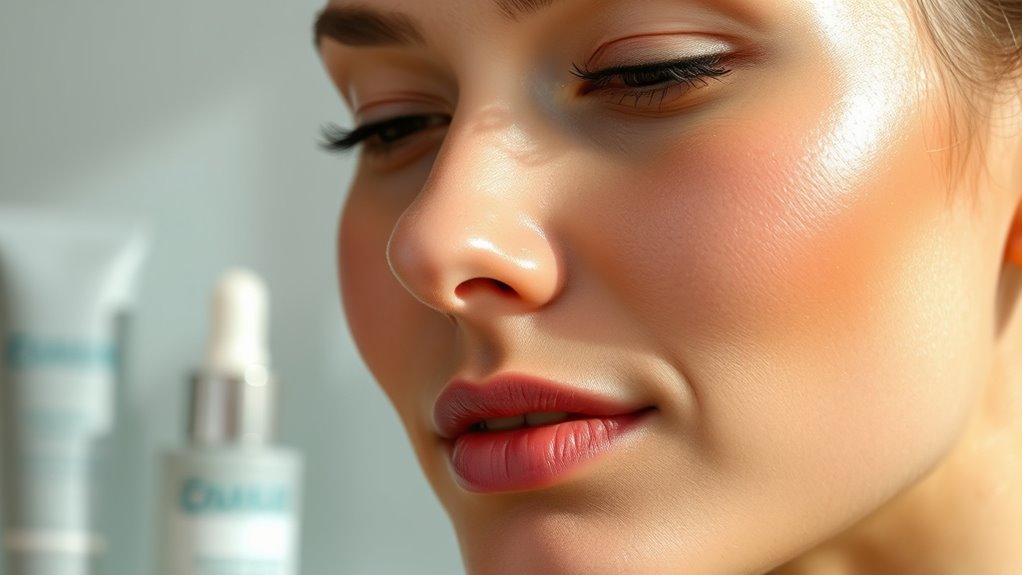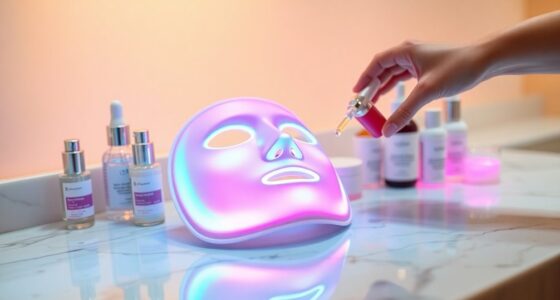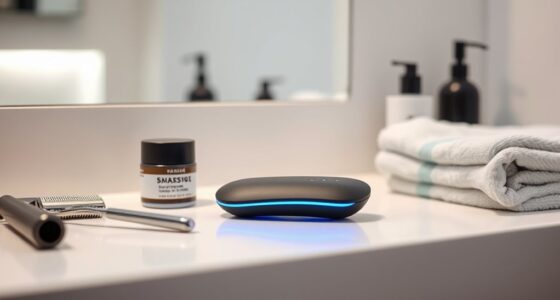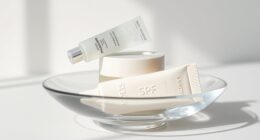In 2025, strengthening your skin’s barrier focuses on gentle, natural care. Use mild cleansers, avoid harsh scrubs, and apply barrier-repair creams with ceramides, fatty acids, and antioxidants. Incorporate nourishing natural oils like jojoba and squalane to hydrate deeply. Consistency is key, so stick to a tailored routine that fosters resilience over time. Keep exploring how these sustainable habits can transform your skin’s health and strength gradually.
Key Takeaways
- Prioritize gentle, sulfate-free cleansers and avoid harsh scrubs to preserve the skin’s lipid barrier.
- Incorporate natural ingredients like ceramides, niacinamide, and plant oils to reinforce and hydrate the skin.
- Maintain consistent skincare routines with barrier repair creams and nourishing oils for long-term resilience.
- Protect against environmental stressors with moisturizers that lock in moisture and support skin defenses.
- Emphasize personalized, holistic approaches focused on gentle, sustainable practices for optimal barrier health in 2025.

Ever wondered how your skin can stay resilient and healthy despite daily environmental stressors? The secret lies in understanding your skin’s barrier and how to support it effectively. In 2025, barrier repair isn’t just about slathering on creams; it’s about creating a thorough approach that includes the right natural ingredients and tailored skincare routines. Your skin’s protective barrier is essential—it shields against pollutants, allergens, and bacteria while retaining moisture. When this barrier weakens, your skin becomes more prone to irritation, dryness, and signs of aging. The good news is, by focusing on repairing and strengthening it, you can restore your skin’s natural resilience.
Using natural ingredients in your skincare routines is one of the most effective ways to support barrier repair. Look for products infused with ceramides, fatty acids, and antioxidants—these components mimic your skin’s natural composition, helping to replenish and fortify the barrier. Ingredients like niacinamide soothe inflammation, while plant-based oils such as jojoba, squalane, and rosehip seed oil deeply hydrate and restore the lipid layer. Incorporating these natural elements into your daily routine ensures your skin receives gentle yet potent nourishment. It’s important to avoid harsh cleansers or abrasive scrubs that strip away lipids and compromise the barrier further. Instead, opt for gentle, sulfate-free cleansers and avoid over-washing, which can strip your skin of its essential oils.
Your skincare routines should be consistent and tailored to your skin’s specific needs. Start by cleansing with a mild, barrier-friendly formula, then follow with a hydrating serum or moisturizer packed with barrier-supportive ingredients. Applying a barrier repair cream containing ceramides and natural oils after cleansing helps lock in moisture and protect against environmental assaults throughout the day. At night, focus on replenishing your skin with nourishing oils or creams that promote repair while you sleep. Remember, hydration is key—drinking plenty of water and using humidifiers in dry environments can greatly enhance your skin’s ability to repair itself.
In 2025, repairing your skin barrier isn’t about quick fixes but establishing a sustainable routine rooted in natural, gentle ingredients. By integrating these into your daily skincare, you empower your skin to fend off stressors and maintain its natural strength. Patience and consistency are crucial—over time, you’ll notice your skin becoming more resilient, less prone to irritation, and visibly healthier. Ultimately, caring for your barrier is about respecting your skin’s natural defenses and giving it the support it needs to stay balanced and vibrant every day.
Frequently Asked Questions
How Long Does It Take to See Visible Skin Improvements?
You can start seeing visible skin improvements in about two to four weeks when you stick to consistent hydration routines and prioritize sunscreen importance. Staying well-hydrated helps your skin heal faster, while daily sunscreen protects against damage, preventing further issues. Keep in mind, individual results vary, but with regular care and patience, you’ll notice a healthier, more resilient complexion sooner than you think.
Are There Ingredients to Avoid During Barrier Repair?
You should avoid ingredients that can trigger sensitivities or cause adverse ingredient interactions, especially during barrier repair. Stay away from harsh alcohols, fragrances, and certain preservatives like parabens, which can irritate sensitive skin. Also, steer clear of strong acids or retinoids if your skin is very reactive. Always check ingredient labels carefully, and if you have ingredient sensitivities, consult a dermatologist to create a safe skincare routine.
Can Barrier Repair Help With Severe Skin Conditions?
Barrier repair can help with severe skin conditions if you’re careful. You should always do a patch test first to check for ingredient sensitivity. While it can improve skin strength and reduce irritation, some conditions may need medical treatment. If your symptoms persist or worsen, consult a dermatologist. Properly repairing your skin barrier supports healing, but don’t rely solely on barrier repair products for severe conditions.
Is Barrier Repair Effective for Sensitive or Allergic Skin?
Is your sensitive skin reacting to everyday triggers? Barrier repair can be highly effective for sensitive or allergic skin because it helps strengthen your skin’s natural barrier. By reducing sensitive skin triggers and preventing allergic reactions, you create a more resilient complexion. When your skin barrier is intact, it’s better equipped to defend against irritants, making barrier repair a smart step toward calmer, healthier skin.
How Often Should I Reapply Barrier Repair Products?
You should reapply barrier repair products as needed, typically 2-3 times daily, depending on your skin’s condition. Use a consistent product with stable ingredient potency to guarantee effectiveness. Pay attention to your skin’s response; if it feels dry or irritated, reapply more frequently. Maintaining a regular routine helps strengthen your skin barrier, but avoid overdoing it to prevent irritation. Adjust based on your skin’s needs.
Conclusion
Now that you understand the power of Barrier Repair 2.0, it’s time to prioritize your skin’s health. Strengthening your skin barrier isn’t a quick fix, but with consistency, you’ll see lasting results. Remember, a chain is only as strong as its weakest link—so take care of your skin daily. By nourishing and protecting it, you’re building resilience for years to come. Invest in your skin now; it’s the foundation of your confidence tomorrow.








